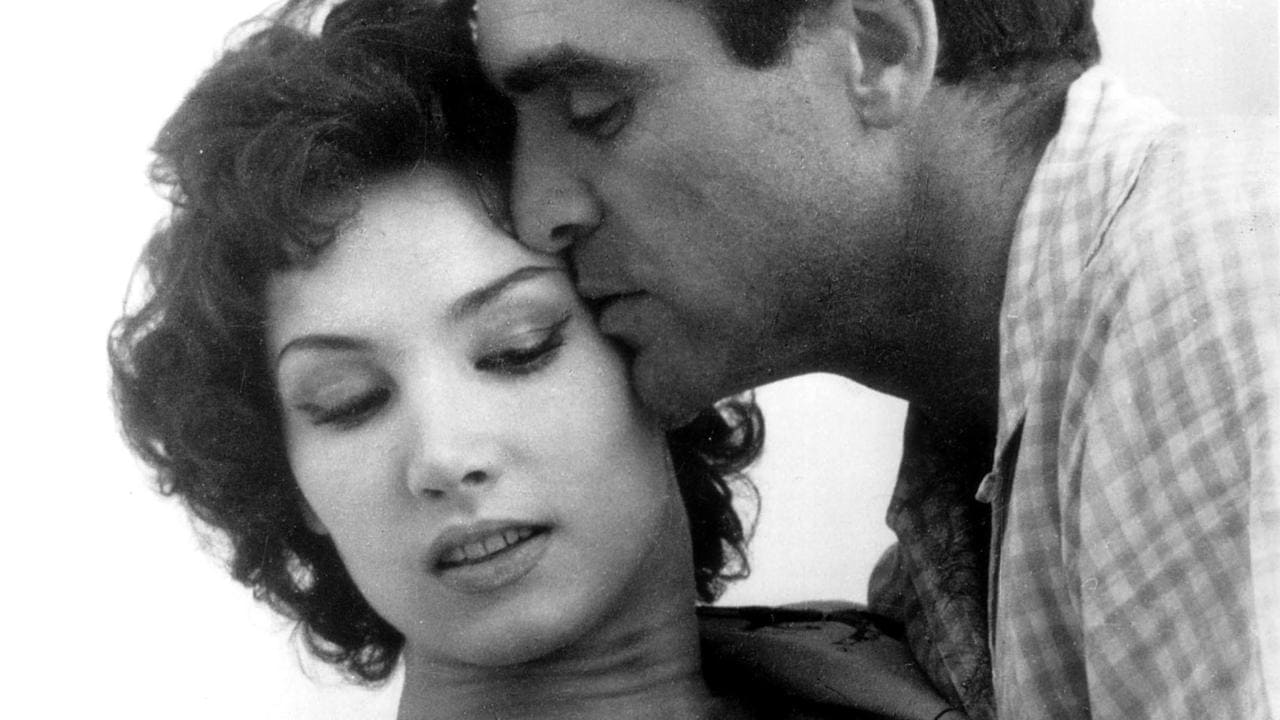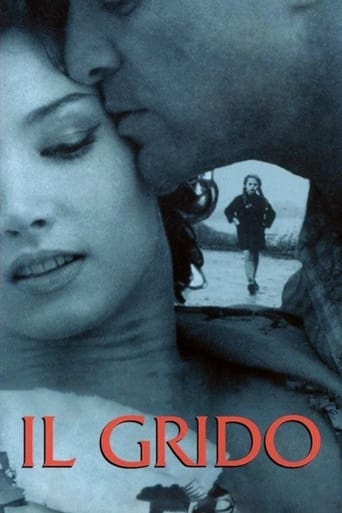

To me, this movie is perfection.
... View MoreAm I Missing Something?
... View MoreI like movies that are aware of what they are selling... without [any] greater aspirations than to make people laugh and that's it.
... View MoreThe movie's not perfect, but it sticks the landing of its message. It was engaging - thrilling at times - and I personally thought it was a great time.
... View MoreUnique amongst the Antonioni films I've seen, in that it has a lower class and sympathetic lead character. A worker is rejected by his long time lover when he asks to marry her, and takes their shared 7 year old daughter and hits the road in response, meeting and struggling with various women along the way. A much more naturalistic and neo-realist film than other Antonioni films, interesting and moving, with a much clearer POV and story. It's also very well shot, although in a more subtle, less breathtaking way than his other work. But it does succumb to melodramatics at times, and the acting is OK, not great. There's also a touch of misogyny. But this is still a solid work by a master film-maker, so worth checking out if Antonioni is of interest to you.
... View MoreIn the total of Antonioni's films, 'Il grido' (= Italian for 'the outcry') makes an exception: it is entirely set in a worker's environment. Usually Antonioni's actors and actresses perform people who don't earn their living by physical labor.Produced shortly before Antonioni's famous trio 'La Notte', 'L'eclisse' and 'L'avventura', this film from 1957 clearly shows the theme Antonioni got so famous with: men losing their roots, being dislocated & disoriented by the advancement of technology. Around 1960 this pessimism was very current.On top of this, 'Il grido' carries every other Antonioni-feature. Fine shooting, while emphasizing on geometries in buildings and landscapes (Antonioni was educated as an architect). First class actors and actresses who seldom laugh and make joy. And, as I already mentioned, a pessimistic theme linked with some grand-scale technical advancement.Antonioni is renowned as 'the poet of misery'; 'Il grido' is quite in line with this statement.
... View MoreFor those who've been attending the Retrospective religiously, one of the best bits during the screening is the introduction to each movie as presented by Lorenzo Codelli, where he shares some little known facts of the movie with the audience. Today we were told that Monica Vitti actually was featured in Il Grido, not in person though but providing the dubbed voice behind Dorian Gray's character Virginia. So their collaboration stretched further back, even before L'Avventura.The story centers on a working class sugar refinery worker Aldo (American actor Steve Cochran) who we learn has waited for 7 years cohabiting with Irma (Alida Valli), whose husband had recently passed away while in Australia. Thinking that this is a blessing in disguise in that he can finally marry Irma, Aldo gets the biggest surprise when he learns that the love of his life had in the last 4 months, given her heart to someone else. In rage he dished out unforgivable physical violence in public on her, and with a broken heart, picks up his daughter Rosina (Mima Girardi) to embark on an aimless road trip, wandering all over Po valley (which was the subject of one of Antonioni's early documentary).Shot in the great outdoors, there's always a lingering mist in the first half of the movie, as if to accentuate Aldo's state of uncertainty and blur in his current state of life, without a clue what lies ahead as he drifts from location to location, and from person to person, as if like a person on a rebound, latching onto every opportunity that present itself to him, but all this while having absolutely no plans and unsure of what to do. While he seeks out his first love Elvia (Betsy Blair) and there comes this speed boat race, I thought Il Grido really picks up when he wanders toward a highway petrol kiosk, and meets with Virginia (Dorian Gray) and her alcoholic aged father (played by Guerrino Campanini).Romancing the lady boss for food and lodging, having his daughter at his side demonstrated in truth that his relationship with and welfare for his daughter takes precedence over everything else, so while on the surface he might seem aimless, deep down he still bears a sense of responsibility to provide for Rosina, which probably gave him an invisible guiding hand in what he was doing, until of course he clinically evaluated and decided otherwise.As he goes from woman to woman, having short temporal relationships with everyone we see on screen from Elvia to Andreina (Lynn Shaw), each played out like small skits, but a common thread running through it is that the characters here seem to be people who have wasted away their prime, missed the boat and are holding out for one last possibility at true love and happiness. Irma found hers although at Aldo's expense, and everyone else demonstrated memories with loved ones whom they cannot forget. The ending is nothing less than heart- wrenching, a discovery and affirmation of sad truths when people indeed have moved on, but then you realize that insofar you're still stuck in a rut. Very depressing if you ponder over it.The last act also dwelt on impending change, with landscape changes ordered from the top, with common people on the ground being forced to accept these changes, with little regard to their livelihood. I thought it provided a poignant moment to reflect upon such frenzy, and sometimes the insensitivity that comes together with forced policies probably, and hopefully for the greater good.
... View MoreKnown as "The Outcry" in the U.S. A wonderful if disturbing film about alienation and modern society. Not for those who like bouncy, happy films.The great though relatively forgotten American actor Steve Cochran is near perfect as the worker who finds he cannot communicate, with those he loves, and so begins a downward spiral towards a state of mental disintegration. What is interesting are the Marxist and Freudian overtones that Antonioni puts on the character. The protagonist as the result of his economic position in a capitalist society ( he only has his labour to sell) is uprooted from his community and therefore alienated from his environment, and so becomes alienated from those he loves. The harder he tries the more he withdraws until he perceives he can suffer no more.Cochran always was very good at playing "heavies" or "playboys", and here he manages to bring both to his underdog character who is strong, brutish and handsome. At the same time he manages to convey the loneliness and vulnerability the character lives through showing that those attributes are not enough to survive.Antonioni directs with a sure hand a picture of a successful, postwar, industrial Italy where everything is not as easy as it seems. Needless to say the film is in black and white and photographed in grainy neo realist style. The landscapes, in true Antonioni fashion, are bleak, and the loneliness and isolation from others is reflected in the distance between buildings. The leisured pacing, adds to the feeling that life drags on without change.Antonioni's characters normally, as his films L'eclisse and Red Desert, as with fellow Italian directors Fellini and De Sica during the same period, usually have uncertain futures, as if there is a hidden side to Italy's postwar economic miracle. Here, it's as if the protagonist has a manifest destiny from which there is no redemption.
... View More